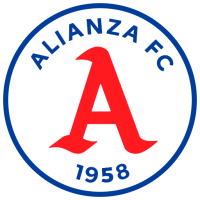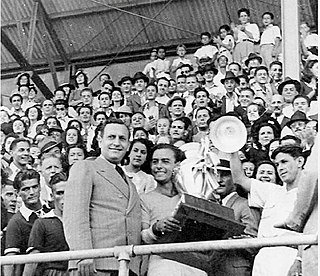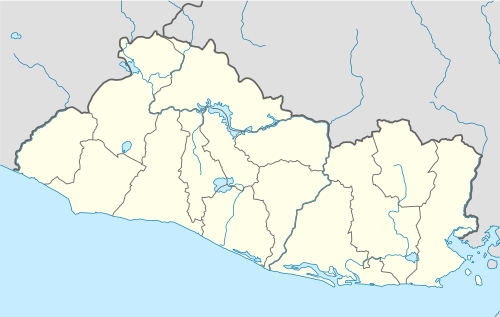
The Honduras national football team represents Honduras in men's international football. The team is governed by the Federación Nacional Autónoma de Fútbol de Honduras. They are nicknamed Los Catrachos, La Bicolor, or La H.

The El Salvador national football team, known as La Selecta, represents El Salvador in international football, and is governed by the Salvadoran Football Federation (FESFUT).

Alianza Fútbol Club, also known simply as Alianza, is a professional football club based in San Salvador, El Salvador. Founded in 1958, Alianza was almost immediately successful, winning its first championships in the 1966 and 1967 Salvadoran seasons. Even more significantly, Alianza was the first Central American and Salvadoran club to win the CONCACAF Champions' Cup in 1967, and is currently one of only three Salvadoran teams to have done so.
The 1967 South American Football Championship was won by hosts Uruguay, with Argentina finished second. Brazil and Peru withdrew from the tournament. It was the first tournament in which Venezuela participated.
The seventh edition of the football tournament at the Pan American Games was held in four cities in Mexico: Mexico City, Guadalajara, Toluca, and Puebla, from 13 October to 25 October 1975. Thirteen teams competed in a round-robin competition, with Argentina defending the title. After the preliminary round there was a second round, followed by a knock-out stage.
The CONCACAF Central American Zone of the CONCACAF zone of the 2002 FIFA World Cup qualification was contested between six teams from the Central America zone. The teams were divided into two groups of three teams each. The teams played against each other on a home-and-away basis. The group winners advanced to the semi-final round. The runners-up advanced to the play-offs.
The CONCACAF Semi-final round of the CONCACAF zone of the 2002 FIFA World Cup qualification, was contested between the 12 remaining teams of the qualification process. The teams were divided into three groups of four teams each. They would play against each other on a home-and-away basis. The group winners and runners-up would advance to the Final round.
The 1989 CONCACAF Championship was the tenth and final edition of the CONCACAF Championship held under the format of serving as qualification to the 1990 FIFA World Cup and having no host nation for the final round. The tournament would be succeeded by the CONCACAF Gold Cup in 1991.
The 1985 CONCACAF Championship was the ninth edition of the CONCACAF Championship. It also served as the qualification for the 1986 World Cup. A total of 18 CONCACAF teams entered the competition. The North, Central American and Caribbean zone was allocated 2 places in the final tournament. Mexico, the World Cup host, qualified automatically, leaving 1 spot open for competition between 17 teams. Canada earned their first major title and clinched qualification on 14 September 1985 to participate in their first World Cup after beating Honduras 2–1 at King George V Park in St. John's, Newfoundland.
The 1963 CONCACAF Championship was the first edition of the CONCACAF Championship, the football championship of North America, Central America and the Caribbean (CONCACAF). The tournament was held between 23 March to 7 April. Nine teams participated in the inaugural event.
The 1965 CONCACAF Championship, the second edition of the CONCACAF Championship, was held in Guatemala from 28 March to 11 April.

The 1941 CCCF Championship was the first edition of CCCF Championship, the most important tournament of the extinct Central American and Caribbean Football Confederation, CCCF. The tournament took place from May 8 to 18, 1941 in the Costa Rican capital.
The 1969 CONCACAF Championship was the fourth edition of the CONCACAF Championship, the football championship of North America, Central America and the Caribbean (CONCACAF). The tournament was held between 23 November to 8 December. Six teams participated in the tournament playing in the round-robin format to determine the winner. A late application by Haiti was rejected.
The 1960 Panamerican Championship was the third and final edition of the Panamerican Championship, an international football tournament featuring national teams from North, Central and South America. It was hosted in San José, Costa Rica, between March 6 and March 20, in 1960. All the matches were held at Estadio Nacional.
The association football competition at the 2002 Central American and Caribbean Games was held between 23 November and 7 December 2002, although qualification took place beforehand. El Salvador, the tournament's host, drew with Mexico in the final 1–1, eventually defeating Mexico in a penalty shoot-out 4–3, winning its second title and the first title since 1954.

The football tournament at the 1935 Central American and Caribbean Games was held in San Salvador from 24 March to 3 April. The tournament was the second association football tournament held at the Central American and Caribbean Games, with the first tournament being held in 1930 in Havana. All matches were held at the Estadio Nacional Flor Blanca.

The football tournament at the 1938 Central American and Caribbean Games was held in Panama City from 10 to 23 February.

The football tournament at the 1946 Central American and Caribbean Games was held in Barranquilla from 9 to 21 December. Cuba and Mexico withdrew.
The CONCACAF Gold Cup is North America's major tournament in senior men's football and determines the continental champion. Until 1989, the tournament was known as CONCACAF Championship. It is currently held every two years. From 1996 to 2005, nations from other confederations have regularly joined the tournament as invitees. In earlier editions, the continental championship was held in different countries, but since the inception of the Gold Cup in 1991, the United States are constant hosts or co-hosts.
The El Salvador–Honduras football rivalry is a sports rivalry between the El Salvador and Honduras national football teams. The rivalry between the two nations peaked in 1969 when both teams played each other in the 1970 FIFA World Cup qualifiers, and the matches they played between each other, which ultimately saw El Salvador advance to the 1970 FIFA World Cup, were a contributing factor which led to the outbreak of the Football War in July 1969.






